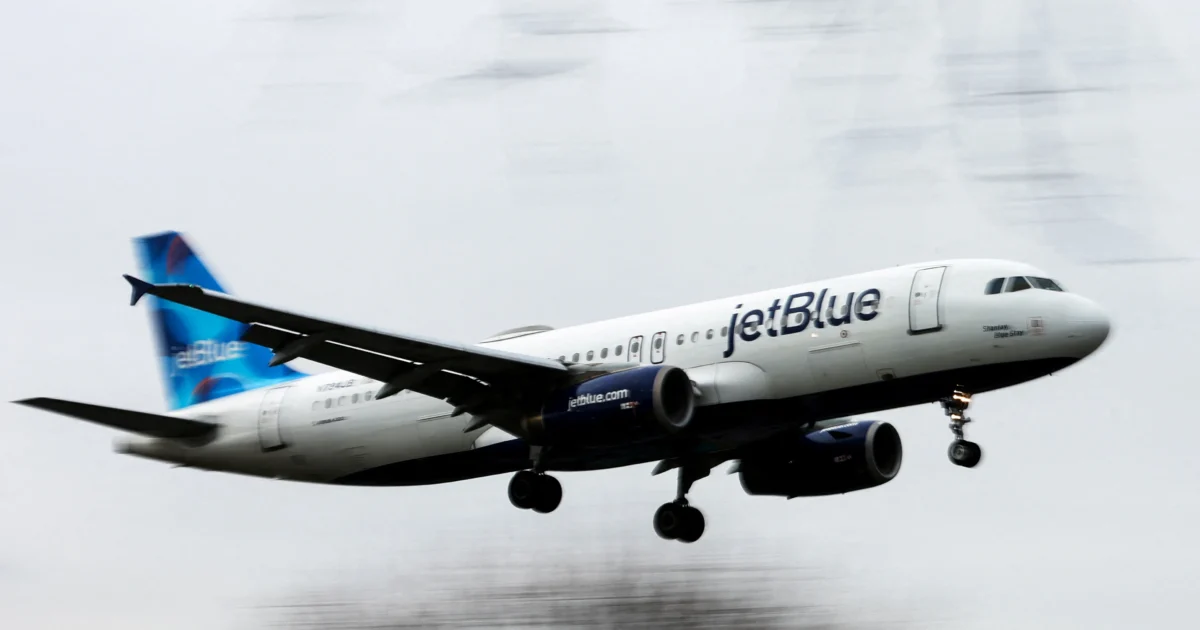JetBlue Airways has been penalized $2 million for persistent flight delays along the East Coast, the first such penalty ever for an airline. The announcement was made Friday by the U.S. Department of Transportation (DOT), which imposed the penalty.
The penalty stems from what the DOT describes as “unrealistic scheduling” by JetBlue. Half of the fine will be used to compensate passengers who experienced delays.
“Illegal chronic flight delays make flying unreliable for travelers. Today’s action puts the entire airline industry on notice that we expect their flight schedules to reflect reality,” Transportation Secretary Pete Buttigieg said in the announcement.
The Transportation Department cited JetBlue flights from June 2022 to November 2023 which had frequent delays on routes between New York’s John F. Kennedy International Airport and Raleigh-Durham International Airport in North Carolina, despite several warnings from the agency. The agency also noted persistent delays on flights connecting JFK with Fort Lauderdale and Orlando, Florida, as well as between Windsor Locks, Connecticut, and Fort Lauderdale.
The DOT said the airline operated such flights with what it defined as “chronic delays” at least 145 times during the same period, with each flight chronically delayed for five straight months in a row or more. The agency defines a chronically delayed flight as one that operates at least 10 times a month and arrives more than 30 minutes late more than half the time, or flights that were canceled.
JetBlue, however, contends that the government shares responsibility for the delays. Derek Dombrowski, a spokesperson for the airline, told the Associated Press, “While we’ve reached a settlement to resolve this matter regarding four [routes] in 2022 and 2023, we believe accountability for reliable air travel equally lies with the U.S. government, which operates our nation’s air traffic control system.”
In his statement, Dombrowski emphasized the need for modernizing “outdated” air traffic control technology and addressing understaffing of controllers, issues he suggested should be prioritized by the incoming Trump administration.
The DOT’s order requires JetBlue to cease and desist its chronic flight delays and pay the $2 million penalty. Half of this amount, $1 million, will be paid directly to the U.S. Treasury, with the other half earmarked for affected JetBlue passengers.
This compensation for affected passengers also includes any future flight cancellations or delays of three hours or more caused by JetBlue within the next year. The future compensation must be valued at a minimum of $75 for each affected passenger, according to the Department of Transportation.
The DOT’s action against JetBlue is part of a broader initiative by the Biden–Harris Administration to expand airline passenger rights. Since the President took office, the agency has recorded a record amount of refunds issued to travelers and the largest fines issued to airlines for failing passengers, the agency said.
Some of such changes include a new rule requiring airlines to provide automatic cash refunds to passengers and another protecting consumers from surprise airline junk fees. The Transportation Department has also created a rule to protect airline passengers with disabilities, requiring more training for airline staff and more rigorous training related to assisting the disabled.
The DOT has also asked airlines to provide food, lodging, and other support when they strand passengers. All ten large U.S. airlines have committed to providing passengers with free rebooking, meals, hotel accommodations, and other amenities when they are responsible for causing a significant delay or cancellation.
The Transportation Department’s efforts have resulted in nearly $4 billion in refunds and reimbursements returned to airline passengers, including over $600 million owed to passengers affected by the Southwest Airlines holiday meltdown in 2022.
Since President Biden took office, the DOT has also largely ramped up its enforcement of such rules, issuing nearly $225 million in penalties against airlines for consumer protection violations. The latest penalties are a drastic difference compared to the period between 1996 and 2020, when the DOT collectively issued just over $70 million in such penalties, according to the agency.

